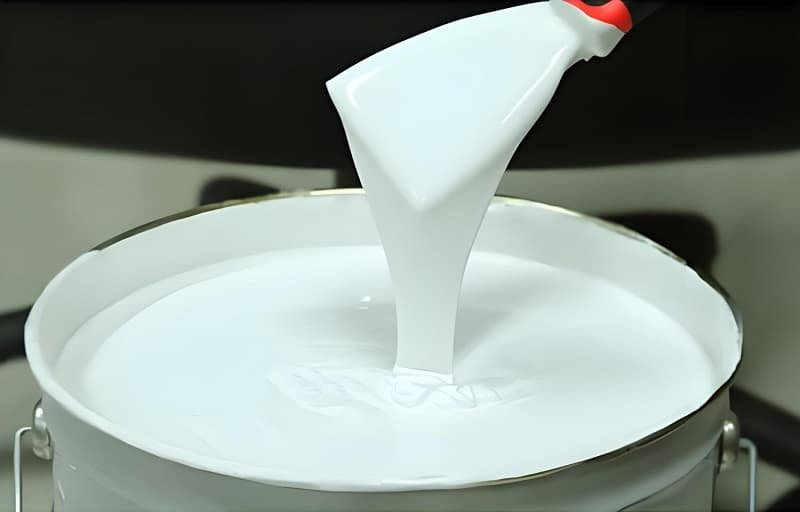
MelaColl Hydroxypropyl methyl cellulose (HPMC) can be divided into two types: the surface treated HPMC and non-surface treated HPMC. The surface-treated type also called delayed solubility/hydration HPMC, refers to using a cross-linking agent to treat its surface in the production process so that the HPMC can quickly disperse in cold water, but it will not dissolve at this step. By even stirring, it will dissolve and the viscosity will slowly build up.
In contrast, the non-surface treated type HPMC will clump when it is in cold water, but when it mixes with hot water, it will quickly disperse. By stirring, the temperature of the solution will drop to a certain temperature (In our company, the gel-forming temperature of the resulting product is around 65°C-75°C). The viscosity will slowly build up until a transparent viscous colloid is formed.
The physical and chemical indexes of the surface treated and the non-surface treated HPMC are the same, but they are different in the application areas.
Non-surface treated HPMC
 The non-surface treated hydroxypropyl methyl cellulose (HPMC) is mainly applied in the dry-mixed mortars such as mortar and putty. By applying dry and even mixing, the HPMC in the resulting mixture of will become separated by other materials. The viscosity will immediately build up after adding water and the resulting product will not clump together; In the production of glue and paint, clumping phenomenon will occur. Therefore, hot water or sufficient stirring must be applied to dissolve the clumps.
The non-surface treated hydroxypropyl methyl cellulose (HPMC) is mainly applied in the dry-mixed mortars such as mortar and putty. By applying dry and even mixing, the HPMC in the resulting mixture of will become separated by other materials. The viscosity will immediately build up after adding water and the resulting product will not clump together; In the production of glue and paint, clumping phenomenon will occur. Therefore, hot water or sufficient stirring must be applied to dissolve the clumps.
Surface treated or delayed solubility HPMC
 Compared to the non-surface treated HPMC, the delayed solubility HPMC has a wider application area. The delayed solubility HPMC can be utilized in gray calcium-based putty and cement-based mortar.
Compared to the non-surface treated HPMC, the delayed solubility HPMC has a wider application area. The delayed solubility HPMC can be utilized in gray calcium-based putty and cement-based mortar.
Moreover, the delayed solubility HPMC can also be applied in glue and coating. Under an alkaline condition, the delayed solubility HPMC can rapidly achieve a certain calibrated viscosity; In gypsum-based mortar, due to the acidic pH value of gypsum, the delayed solubility hypromellose or HPMC will only become viscous very slowly. The initial setting of construction-grade gypsum can be achieved in or more than 3 minutes.
However, the final setting can only be formed in or less than 30 minutes. Although a certain amount of retarder is required in the gypsum-based mortar to delay the time of setting, the operating time of the resulting gypsum-based mortar is still not as good as the cement-based and gypsum-based products. Therefore, some alkaline materials must be added to increase the time of the HPMC becoming viscous.
In summary
Delayed dissolution is generally used in water-based substances, such as detergents, cements, and wet-mixed mortars. The delayed-dissolving hpmc needs to be added to the cement base at a content of 2%. The non-delayed dissolving hpmc is our company's main product. Delayed dissolution in neutral aqueous solution does not become viscous within one to two hours, while non-delayed dissolution in aqueous solution immediately becomes viscous. In one case, the viscosity-onset time of the delayed-dissolving hpmc and the non-delayed-dissolving HPMC is the same, that is, in an alkaline solution and the pH value is less than 9. At this time, the application fields of the two types of hpmc may overlap.
MelaColl™ is a trademark for MIKEM’s cellulose products and derivatives. Our MelaColl™ products include Hydroxypropyl Methyl Cellulose (HPMC) and Hypromellose (HEC), Hydroxyethyl Methyl Cellulose (HEMC). Within it, The raw material of hydroxypropyl methylcellulose is refined cotton. Hydroxypropyl methyl cellulose (HPMC) or hypromellose is one of the most hot-selling products of MelaColl™ brand. Our MelaColl HPMC products are available in a wide range of grades to offer functional properties and enhance product performance in many construction applications.


Leave a Reply